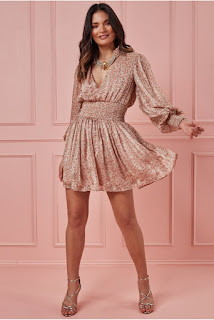8 KEY DIFFERENCES BETWEEN COCKTAIL DRESSES AND EVENING DRESSES
In the world
of sophisticated fashion, cocktail dresses and evening dresses are two distinct
categories that serve different purposes and evoke unique styles. Understanding
the differences between these two types of dresses is essential for making
informed wardrobe choices for various occasions. Whether it's a night out on
the town or a formal gala, the right dress can make a powerful statement. In
this article, we will delve into eight key differences between cocktail dresses
and evening dresses, shedding light on their individual characteristics and
helping you navigate the world of elegant attire.
Occasion and
Formality:
The primary
distinction between cocktail dresses and evening dresses lies in the occasion
for which they are intended. Cocktail dresses are typically designed for
semi-formal to formal events that fall short of black-tie galas. These dresses
are ideal for cocktail parties, weddings, and upscale dinners. On the other
hand, evening dresses, also known as formal dresses, are crafted for more
prestigious and formal occasions such as galas, red-carpet events, and
black-tie affairs. The formality of the event often dictates the appropriate
choice between the two.
Length and
Silhouette:
The length
and silhouette of the dress play a crucial role in defining its formality.
Cocktail dresses are generally shorter, often falling above or just below the
knee. This length offers a flirtatious and playful vibe, making cocktail
dresses perfect for a range of semi-formal events. In contrast, evening dresses
are characterized by their floor-length silhouettes, adding a touch of grandeur
and sophistication. The sweeping length of evening dresses contributes to a
more formal and elegant appearance, creating a red-carpet-ready aesthetic.
Detailing
and Embellishments:
Detailing
and embellishments are key elements that differentiate cocktail dresses from
evening dresses. Cocktail dresses often feature bold and playful details such
as sequins, lace, and beading, contributing to a lively and spirited look.
These embellishments are strategically placed to add visual interest without
overwhelming the overall design. In contrast, evening dresses lean towards
opulence and intricate detailing. Elaborate beadwork, sequins, and luxurious
fabrics are commonly used to create a sense of regality and glamour befitting
formal events.
Necklines
and Sleeve Length:
The choice
of neckline and sleeve length further distinguishes cocktail dresses and
evening dresses. Cocktail dresses frequently showcase a variety of necklines,
from classic V-necks to strapless and one-shoulder styles. Sleeve lengths can
vary, with options ranging from sleeveless to short sleeves. These design
choices contribute to the versatility of cocktail dresses, allowing for a range
of looks. Evening dresses, on the other hand, often feature more sophisticated
necklines such as plunging V-necks, off-the-shoulder, or high necklines. Sleeve
lengths may include long sleeves or elegant cap sleeves, adding to the dress's
formality and timelessness.
Colour
Palette:
The colour
palette is another aspect where cocktail dresses and evening dresses diverge.
Cocktail dresses embrace a broader spectrum of colours, including vibrant hues,
bold prints, and playful patterns. This diversity allows for creativity and
individual expression, making cocktail dresses suitable for a variety of
settings. In contrast, evening dresses tend to adhere to a more subdued and classic
colour palette. Black, navy, deep reds, and neutral tones are commonly chosen
to convey an air of timeless elegance and formality, aligning with the grandeur
of formal events.
Accessories
and Styling:
The
formality of the dress often dictates the accessories and styling choices.
Cocktail dresses lend themselves to a more versatile approach, allowing for a
range of accessories from statement jewellery to bold heels. The emphasis is on
personal expression and creativity. Evening dresses, being more formal, call
for a refined and understated approach to accessories. Elegant clutches,
delicate jewellery, and classic heels are preferred to complement the
sophistication of the gown without overshadowing its inherent glamour.
Versatility
and Wearability:
Cocktail
dresses are celebrated for their versatility and wearability across different
occasions. Their shorter length and varied designs make them adaptable for
everything from semi-formal parties to date nights. The versatility of cocktail
dresses allows for easy transitions between events with different dress codes.
Evening dresses, while undeniably elegant, are less versatile due to their
formality and floor-length silhouette. They are specifically designed for
high-profile events, making them less suitable for casual or semi-formal
settings.
Cultural and
Regional Variations:
Cultural and
regional variations also influence the distinctions between cocktail dresses
and evening dresses. In some cultures, cocktail dresses may be considered
appropriate for a wider range of formal events, while evening dresses may be
reserved for the most prestigious occasions. Additionally, regional preferences
may impact the accepted styles, colours, and lengths for both types of dresses.
Understanding these cultural nuances can be valuable when choosing the right
dress for a specific event.
Conclusion:
In
navigating the realm of elegant attire, recognizing the differences between
cocktail dresses and evening
dresses is essential for making a statement that aligns with the formality
and nature of the occasion. Whether you opt for the playful versatility of a
cocktail dress or the regal glamour of an evening gown, both styles offer
unique expressions of elegance and personal style. Goddiva, with its diverse
collection of dresses, provides options that cater to a spectrum of
preferences, ensuring that women can confidently choose the perfect dress for
any occasion, be it a lively cocktail party or a sophisticated black-tie
affair.




Comments
Post a Comment